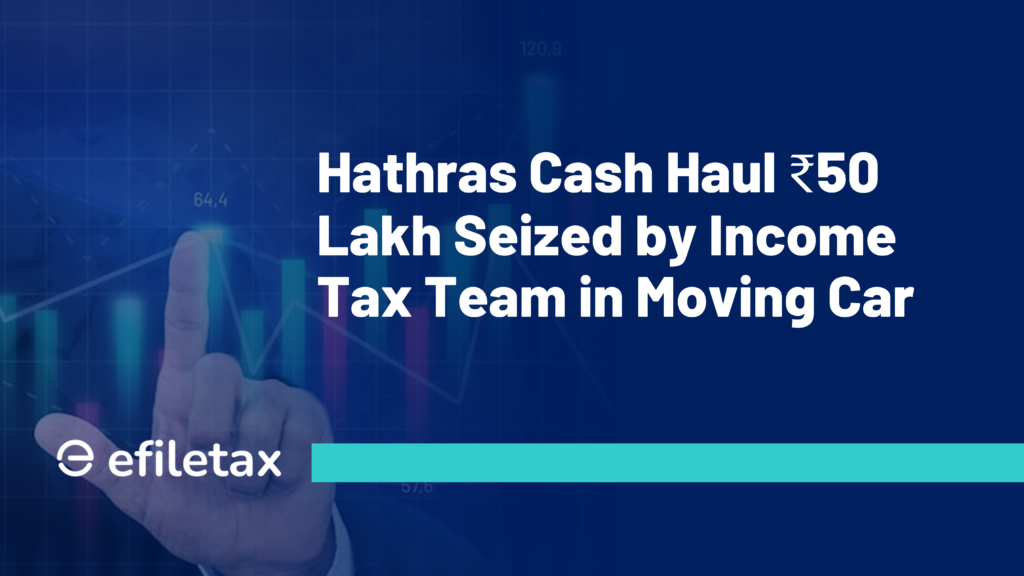
₹50 Lakh Seized in Car: What Hathras Raid Reveals About Cash Compliance
The recent Income Tax cash seizure in Hathras—where officers confiscated ₹50 lakh from a car and detained two individuals—has once again brought the spotlight on the legal limits of cash transactions and the risks of non-compliance.
Let’s break down the law behind such seizures and what you should know to stay on the right side of the Income-tax Act.
Why Was the Cash Seized?
Under the Income-tax Act, 1961, unexplained cash found during search or survey operations can be seized under:
- Section 132 (Search & seizure during raids)
- Section 133A (Survey operations by IT Department)
- Section 69A (Unexplained money deemed as income if not recorded in books)
What Does the Law Say About Carrying Cash?
There is no absolute ban on carrying cash in India. But there are strict limits and documentation requirements:
| Transaction Type | Cash Limit | Legal Provision / Rule |
|---|---|---|
| Cash loan or deposit | Above ₹20,000 | Section 269SS |
| Repayment of loan | Above ₹20,000 | Section 269T |
| Cash received for sale of property | Above ₹20,000 | Section 269SS |
| Cash transactions in business | Above ₹10,000/day | Section 40A(3) – Disallowed as expense |
| Donation in cash | Max ₹2,000 | Section 80G |
| Political party donation (cash) | Max ₹2,000 | Section 29C of RPA, 1951 |
Legal Consequences of Violating Cash Rules
- 100% penalty under Section 271D or 271E (for violating 269SS/269T)
- Taxable as income under Section 69A
- Seizure of cash during IT raids or surveys
- Prosecution risk in serious cases
In the Hathras case, the two individuals are likely to face penalty, tax demand, and possible prosecution under these provisions.
Expert View: What Should You Do if Carrying Large Cash?
“Always carry a proper invoice, PAN details, and source explanation. If it’s for business purposes, ensure it’s recorded in books.”
— Efiletax Compliance Desk
Also, inform your tax advisor in advance if you expect to move large amounts for events, purchases, or withdrawals.
Can the Seized Cash Be Released?
Yes, but only if:
- The person explains the source of income
- The cash is recorded in books of accounts
- It is not linked to undisclosed income or benami deals
- You file a legal reply and furnish documents within timelines
Recent Case References
- CBDT’s Press Release (2023) reiterated the crackdown on cash-based political funding and benami transactions.
What This Means for Indian Taxpayers
Carrying cash in large amounts may be legal—but only with full transparency. The Hathras case is a warning signal.
If you’re planning a major cash withdrawal, property transaction, or business purchase:
✔ Record everything in books
✔ Avoid cash if above limits
✔ Take advice from a qualified tax consultant
Summary
The Income Tax cash seizure in Hathras of ₹50 lakh shows the risks of carrying undocumented money. Learn what the law says about cash limits, penalties, and how to stay compliant.
Need Help with Income Tax Compliance?
At Efiletax, our experts guide individuals and businesses on legal cash limits, tax planning, and how to avoid penalties.
📞 Contact us now or file online at efiletax.in for full compliance support.
FAQs
Q1. Is it illegal to carry ₹50 lakh cash in India?
Not illegal, but must be justified with source, purpose, and proper documentation.
Q2. What happens if I can’t explain my cash to Income Tax officers?
It can be seized, taxed under Section 69A, and attract penalties up to 100%.
Q3. What are the allowable cash limits for property deals?
You cannot accept ₹20,000 or more in cash for a single property deal—use bank transfer.
Q4. Can I claim seized cash as business expense?
Only if it is accounted for, backed with bills, and within Section 40A(3) limits.